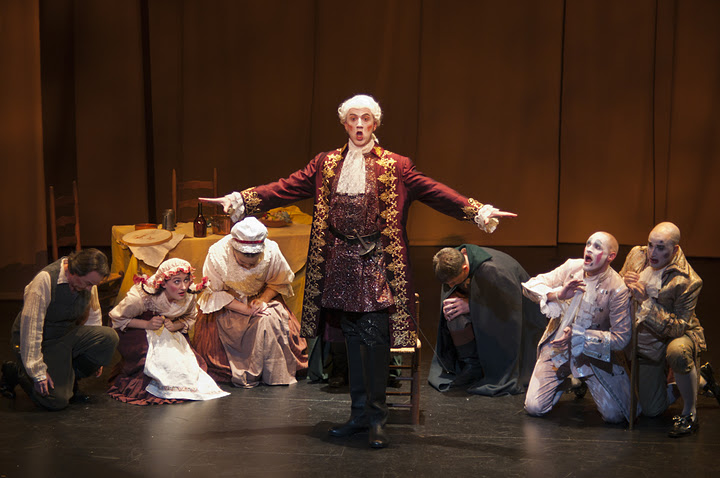Monsigny’s “Le Roi” receives admirable revival from Opera Lafayette

Thomas Michael Allen in Monsigny's "Le Roi et le Fermier," presented Sunday in Washington D.C. by Opera Lafayette. Photo Louis Forget
Pierre-Alexandre Monsigny (1729-1817) was a primary force in creating the genre of the opéra comique, in partnership with librettist Michel-Jean Sedaine. Monsigny did this in spite of deficits in his musical education and compositional technique. Critics of the 18th century often found his harmonic and contrapuntal skills wanting while generally admiring the freshness of his melodic imagination. After enjoying world-wide success, including export to the newly constructed stages of the New World, Monsigny’s operas were eclipsed by works in other styles and almost completely forgotten.
Almost, were it not (in part) for the work of Opera Lafayette, the historically informed performance ensemble based in Washington, D.C. The group revived Monsigny’s Le Déserteur in 2009, with a recording of the work joining the live series released by Opera Lafayette on the Naxos label. Director Ryan Brown has now turned to another of this neglected composer’s most successful works, Le Roi et le Fermier, heard Sunday night in the Kennedy Center Terrace Theater.
Sedaine based his libretto on Robert Dodsley’s English play The King and the Miller of Mansfield, in which the King of England is separated from his hunting party in Sherwood Forest. Taken in by simple woods folk, who do not recognize him, he gets an earful about what kings should and shouldn’t do. Like a good Enlightenment monarch — which was the whole point of the play’s popularity, as wish fulfillment in France during the reign of Louis XV — the King helps these honest folk by providing a dowry for his host’s wedding and takes up their cause against an abusive local seigneur.
It is a cute story with some fizzy dialogue, the kind of work that Sedaine identified as a three-act comedy “with pieces of music mixed in.”
Unfortunately, Opera Lafayette did not take into account the primacy of the spoken element when engaging a cast of singers who could not handle the French dialogue. The solution, along with modest dialogue cuts, was offered in a staging by Didier Rousselet and Monica Neagoy that had Rousselet and Neagoy speak most of the complicated dialogue while the singers made mock movements. The result proved somewhat clumsy; although it was a charming idea to show Rousselet and Neagoy as Sedaine and his wife, come to life from statues standing on either side of the stage when the performance began, inspired by actual busts of the playwright and his wife made by the sculptor Augustin Pajou.
The singing was generally solid from a mostly young and less-tried cast, beginning with a solid performance by tenor Thomas Michael Allen as the King and the slightly slow-witted Richard of baritone William Sharp. Yulia Van Doren was a ditzy Betsy (Richard’s sister), a little light in tone, and Dominique Labelle has sounded in better form than she did as Jenny, who is betrothed to Richard.
Mezzo-soprano Delores Ziegler, as Richard’s mother, rounded out the trio of women nicely, while the most surprising performances came from further down the cast. Baritones Thomas Dolié and David Newman had robust turns as the goofy forest wardens Rustaut and Charlot, while character tenors Jeffrey Thompson and Tony Boutté camped it up as the villainous Lurewel and a sidekick courtier.
Seated in the pit, the orchestral musicians often seemed swallowed up, especially the strings at times. The playing showed Monsigny’s score in a good enough light, although there were some rough edges, in the horns, flauto piccolo, and harpsichord, that will likely be ironed out in subsequent performances. The music has some high points, like the storm scene that connects Acts I and II (complete with the sound of a wind machine), the king’s solo numbers, and the ensembles that become more complex in the third act.
It is more than worth your time to experience the revival, which will be repeated at Lincoln Center in New York Thursday night and in the Opéra Royal de Versailles Feb. 4 and 5 when Opera Lafayette makes its international debut. For the Versailles performances, the company will be singing in front of the actual backdrops used for a staging of Le Roi et le Fermier by Marie-Antoinette and a group of nobles, in the Théâtre de la Reine. The Queen played the role of the simple shepherdess Jenny, not surprising for a woman who had an imaginary village built on the grounds of Versailles, where she pretended to be a simple milkmaid, a sign of either utter perversity or astounding naïveté.
Le Roi et le Fermier will be repeated 7:30 p.m. Thursday in New York at the Rose Theater at Lincoln Center. operalafayette.org/le-roi-et-le-fermier/